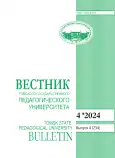Code-Switching and Code-Mixing as Indicators of Modern Persian Bilingual Communication
- Authors: Fomin A.G.1, Hakeek A.H.1
-
Affiliations:
- Kemerovo State University
- Issue: No 4 (2024)
- Pages: 33-40
- Section: THEORETICAL AND APPLIED LINGUISTICS
- URL: https://bakhtiniada.ru/1609-624X/article/view/268877
- DOI: https://doi.org/10.23951/1609-624X-2024-4-33-40
- ID: 268877
Cite item
Full Text
Abstract
The article explores the phenomenon of code-switching and code-mixing be-tween Persian (Afghanistan) and English. Code-switching refers to the phenomenon of switching between two or more languages within a single conversation, while code-mixing involves the blending of languages within a sentence or utterance. The study focuses on two specific communicative settings. One is informal spoken communication, the other is and literature. To conduct the research, the data was collected from a group chat involving 30 students studying English Language and Literature at Balk University’s Faculty of English in Afghanistan. The group was created to discuss academic and non-academic issues informally. The messages ex-changed in this group chat serve as a case study for analyzing informal conversational communication. Additionally, the novels of Khaled Hosseini, an American author of Afghan origin who is fluent in both Persian (Afghanistan) and English, were chosen as examples of literature. Khaled Hosseini has gained international recognition for his writings. His works often explore themes of identity, family, love, loss, and the impact of political turmoil on individuals and society. The paper be-longs to the specialty 5.9.8. Theoretical, applied and comparative linguistics (philo-logical sciences). The main objective of the research is to identify the reasons and purposes behind code-switching and code-mixing in different communicative set-tings. By examining the patterns and contexts in which these language practices oc-cur, the study aims to gain a deeper understanding of the motivations behind them. Overall, this research seeks to shed light on the phenomenon of code-switching and code-mixing between Persian (Afghanistan) and English by analyzing both informal spoken communication and literature, to unravel the reasons and purposes behind these language practices.
About the authors
Andrey Gennadyevich Fomin
Kemerovo State University
Author for correspondence.
Email: andfomin67@mail.ru
Kemerovo, Russian Federation
Abdul Hack Hakeek
Kemerovo State University
Email: salehhaqiq@gmail.com
Kemerovo, Russian Federation
References
- Heller M. Code-switching by Penelope Gardner-Chloros. Journal of Sociolinguistics, 15. 2011. https://doi.org/10.1111/j.1467-9841.2010.00471.x
- Myers-Scotton C., Jake L. J. Explaining Aspects of Code-switching and Their Implications. In: J. Nicol (Ed.), One Mind, Two Languages: Bilingual Language Processing. Blackwell. 2001. Pр. 84–116.
- De Bot K. Cognitive Processing in Bilinguals: Language Choice and Code-switching. In: R. B. Kaplan (Ed.), The Oxford Handbook of Applied Linguistics. Oxford University Press. 2002. Pр. 287–300.
- La Heij W. Selection Processes in Monolingual and Bilingual Lexical Access. In: J. F. Kroll & A. M. B. de Groot (Eds.). Handbook of Bilingualism: Psycholinguistic approaches. Oxford University Press, 2005. Pр. 289–307.
- Ullman M. Bilingualism. Language and Cognition, 4 (2), 2001, pp. 105–122.
- Souadkia M. Code-switching in Bilingual Education. Languages. Nations. Cultures: Almanac of scientific articles, RUDN Publ., 2017. Pр. 304–326.
- Zabrodskaya A. Evaluating the Matrix Language Frame Model on the Basis of a Russian-Estonian Code-switching Corpus. International Journal of Bilingualism, 13 (3), 2009, pp. 123–137.
- Chirsheva G. N. Dvuiazychnaia kommunikaciia [Bilingual communication]. Cherepovets, 2004.
- Rusakov A. Code-switching Phenomena in Gypsy Children Narratives. In: VIII International Congress for the Study of Child Language: Abstracts, 1999. Pр. 184–185.
- O’Brien de Ramírez K. Developmental Processes in Bilingualism as Reflected in the Code-switching Strategies of Young Language Learners. In: VIII International Congress for the Study of Child Language: Abstracts, 1999. Pр. 162–171.
- Auer P. The Pragmatics of Code-switching: A Sequential Approach. In: Lesley Milroy & Pieter Muysken (Eds.). One Speaker, Two Languages: Cross-disciplinary Perspectives on Code-switching. Cambridge University Press, 1995. Pр. 115–135.
- Pert S., Letts C. Codeswitching in Mirpuri Speaking Pakistani Heritage Pre-school Children: Bilingual Language Acquisition. International Journal of Bilingualism, 10 (3), 2006, pp. 349–374.
- Pavlenko A. L2 Influence on L1 in Late Bilingualism. Perspectives on code-switching, 2000. Pр. 115–135.
- Schwartz B. D., Sprouse R. A. L2 Cognitive States and the Full Transfer, Full Access Model. Second Language Research, 12(4), 1996, pp. 40–72.
- Anzaldúa G. Borderlands. La Frontera: The New Mestiza. Aunt Lute Books, 1987.
- Ghosh A. The hungry tide. Houghton Mifflin Harcourt, 2004.
- Hosseini K. The Kite Runner. Riverhead Books, 2003.
- Hosseini K. A Thousand Splendid Suns. Riverhead Books, 2007.
- Milroy L., Gumperz J. J. Language and Social Identity. Cambridge University Press, 1982. 365 p.
- Auer P. Code-switching in Conversation. Language, Interaction and Identity. Routledge, 1998. Pр. 211–235.
- Grosjean F. The Bilingual’s Language Modes. In: J. Nicol (Ed.). One Mind, Two Languages: Bilingual Language Processing. Blackwell, 2001. Pр. 1–22.
- Poplack S. Sometimes I will Start a Sentence in Spanish y Termino en Espanol: Toward a Typology of Code-switching. Linguistics, 18(2), 1980, pp. 581–618.
- Muysken P. Bilingual Speech: A Typology of Code-mixing. Cambridge Univer-sity Press, 2000. 218 p.
- Vihman V. A. Language Interaction in Emergent Grammars: Morphology and Word Order in Bilingual Children’s Code-switching. Languages, 3(40), 2018, pp. 1–23. https://doi.org/10.3390/languages3040040
- Wardhaugh R. An Introduction to Sociolinguistics. Wiley-Blackwell, 2006. 211 p.
- Vishnevskaya G. M. Bilingualism in Literature: Linguistic Interpretation. International Journal of Experimental Education, 2 (2), 2012, pp. 90–91.
- Mishinzeva I. Iu. Code-switching in Literary Works. Language and Culture. Cherepovets State University Publ., 2011. Pр. 98–116.
Supplementary files






